Israel and US lawmakers responded in fury to the exposed IAEA deal that allows Iran to inspect its own nuclear sites, calling the agreement “remarkably naive and incredibly reckless.”
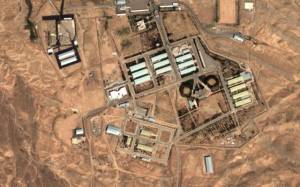
2004 satellite image of the Parchin military complex, suspected of hosting nuclear facilties. (AP/DigitalGlobe-Institute for Science and International Security)
Iran will be allowed to use its own inspectors to investigate a site it has been accused of using to develop nuclear arms, operating under a secret agreement with the UN International Atomic Energy Agency (IAEA) that normally carries out such work, according to a document seen by The Associated Press.
The revelation on Wednesday riled Republican lawmakers in the US who have been severely critical of a broader agreement to limit Iran’s future nuclear programs, signed by the Obama administration, Iran and five world powers in July. Those critics have complained that the wider deal is unwisely built on trust of the Iranians, while the administration has insisted it depends on reliable inspections.
A skeptical House Speaker John Boehner said, “President Obama boasts his deal includes ‘unprecedented verification.’ He claims it’s not built on trust. But the administration’s briefings on these side deals have been totally insufficient – and it still isn’t clear whether anyone at the White House has seen the final documents.”
Rep. Ed Royce, the House Foreign Affairs Committee Chairman, said, “International inspections should be done by international inspectors. Period.”
House Democratic leader Nancy Pelosi merely shrugged off the revelation, saying, “I truly believe in this agreement.”
The newly disclosed side agreement, regarding an investigation of the Parchin military nuclear site by the IAEA, is linked to persistent allegations that Iran has worked on atomic weapons. That investigation is part of the overarching nuclear-limits deal.
Evidence of the inspections concession is sure to increase pressure from US congressional opponents before a Senate vote of disapproval on the overall agreement in early September. If the resolution passes and President Barack Obama vetoes it, opponents would need a two-thirds majority to override it. Even Senate Majority Leader Mitch McConnell, a Republican, has suggested opponents will likely lose a veto fight, though that was before Wednesday’s disclosure.
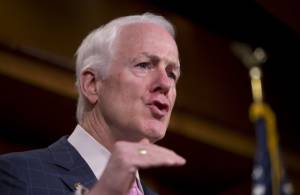
Senate Majority whip John Cornyn. (AP/Manuel Balce Ceneta)
John Cornyn of Texas, the second-ranking Republican senator, said, “Trusting Iran to inspect its own nuclear site and report to the UN in an open and transparent way is remarkably naive and incredibly reckless. This revelation only reinforces the deep-seated concerns the American people have about the agreement.”
Republican presidential hopeful Jeb Bush tweeted that the”Iran deal is a farce. Nuclear inspections of state sponsors of terrorism can’t work on the honor system.”
The Parchin agreement was worked out between the IAEA and Iran. The United States and the five other world powers were not party to it but were briefed by the IAEA and endorsed it as part of the larger package.
On Wednesday, White House National Security Council spokesman Ned Price said the Obama administration was “confident in the agency’s technical plans for investigating the possible military dimensions of Iran’s former program… The IAEA has separately developed the most robust inspection regime ever peacefully negotiated.”
All IAEA member countries must give the agency some insight into their nuclear programs. Some are required to do no more than give a yearly accounting of the nuclear material they possess. But nations— like Iran — suspected of possible proliferation are under greater scrutiny that can include stringent inspections.
The agreement in question diverges from normal procedures by allowing Tehran to employ its own experts and equipment in the search for evidence of activities it has consistently denied — trying to develop nuclear weapons.
Olli Heinonen, who was in charge of the Iran probe as deputy IAEA director general from 2005 to 2010, said he could think of no similar concession with any other country.
The White House has repeatedly denied claims of a secret side deal favorable to Tehran. IAEA chief Yukiya Amano told Republican senators last week that he was obligated to keep the document confidential. Iran has reportedly threatened Amano’s well-being and warned him not to reveal the details.
An Unsafe Inspection Mechanism
Iran has refused access to Parchin for years and has denied any interest in — or work on — nuclear weapons. Based on US, Israeli and other intelligence as well as its own research, the IAEA suspects that the Islamic Republic may have experimented with high-explosive detonators for nuclear arms.
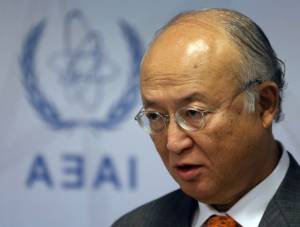
Director General of IAEA Yukiya Amano. (AP/Ronald Zak)
The IAEA has cited evidence, based on satellite images, of possible attempts to sanitize the site since the alleged work stopped more than a decade ago.
The document seen by AP is a draft which, one official familiar with its contents said, doesn’t differ substantially from the final version. He demanded anonymity because he was not authorized to discuss the issue in public.
The document is labeled “separate arrangement II,” indicating there is another confidential agreement between Iran and the IAEA governing the agency’s probe of the nuclear weapons allegations.
Iran is to provide agency experts with photos and videos of locations that the IAEA says are linked to the alleged weapons work, “taking into account military concerns.”
That wording suggests that — beyond being barred from physically visiting the site — the agency will not get photo or video information from areas Iran says are off-limits because they have military significance.
While the document says the IAEA “will ensure the technical authenticity” of Iran’s inspection, it does not say how.
The draft is unsigned, but the proposed signatory for Iran is listed as Ali Hoseini Tash, deputy secretary of the Supreme National Security Council for Strategic Affairs. That reflects the significance Tehran attaches to the agreement.
Iranian diplomats in Vienna were unavailable for comment Wednesday. IAEA spokesman Serge Gas said the agency had no immediate comment.
The main focus of the July 14 deal between Iran and six world powers is curbing Iran’s present nuclear program that could be used to make weapons. But a subsidiary element obligates Tehran to cooperate with the IAEA in its probe of the past allegations.
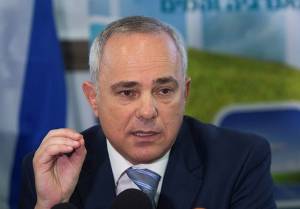
Minister Yuval Steinitz. (Yonatan Sindel/Flash90)
The investigation has been essentially deadlocked for years, with Tehran asserting the allegations are based on false intelligence from the US, Israel and other adversaries. But Iran and the UN agency agreed last month to wrap up the investigation by December, when the IAEA plans to issue a final assessment.
That assessment is unlikely to be unequivocal. Still, it is expected to be approved by the IAEA’s board, which includes the US and the other nations that negotiated the July 14 agreement. They do not want to upend their broader deal, and will see the December report as closing the books on the issue.
Israel responded with rage to the revelations, ridiculing the exposed IAEA side agreement. “One must welcome this global innovation and outside-the-box thinking. One can only wonder if the Iranian inspectors will also have to wait 24 days before being able to visit the site and look for incriminating evidence?” stated National Infrastructures, Energy and Water Minister Dr. Yuval Steinitz, who is responsible for the Iran portfolio. Earlier reports exposed that the inspectors will have to give the Iranian 24 days’ notice before receiving access to the suspected nuclear site.
By: AP and United with Israel Staff
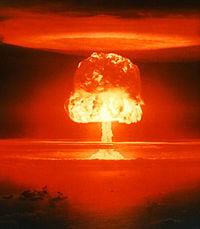
Sign the Petition to Stop a Nuclear Iran
The US Congress must ensure that sanctions against Iran remain in force until the nuclear threat is completely eliminated.
I strongly oppose easing sanctions before the nuclear threat from Iran has been eliminated. Allowing Iran to enrich uranium without being subject to 'anytime, anywhere' inspections is extremely dangerous and unacceptable. Iran's nuclear program must be stopped.
See our Privacy PolicyClick Here to Share the Petition with Your Friends
Click here to locate and contact your Senator.
Click here to locate and contact your Congressman.
